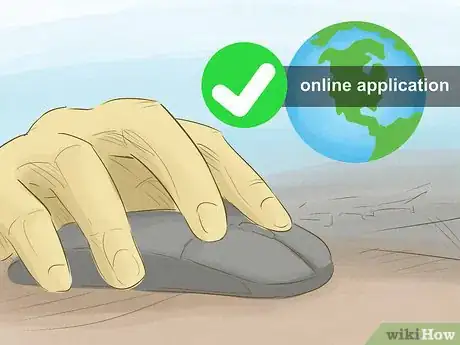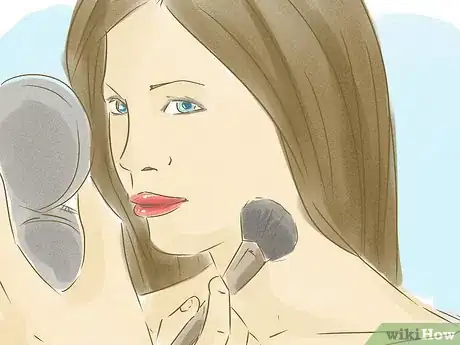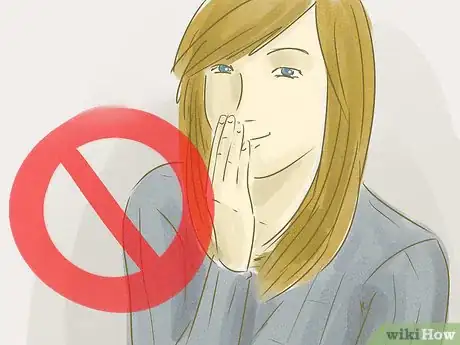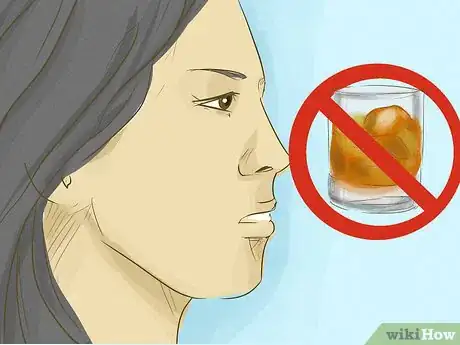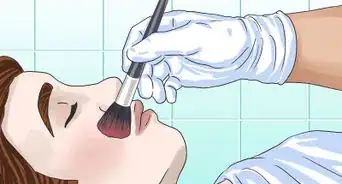This article was co-authored by Yuka Arora. Yuka Arora is a self-taught makeup artist who specializes in abstract eye art. She has been experimenting with makeup art for over 5 years, and has amassed over 5.6K Instagram followers in just 5 months. Her colorful and abstract looks have been noticed by Jeffree Star Cosmetics, Kat Von D Beauty, Sephora Collection, among others.
There are 9 references cited in this article, which can be found at the bottom of the page.
This article has been viewed 70,045 times.
Film makeup artists are responsible for applying makeup to actors and actresses during filming. They play an important role in helping the writers and directors tell a story by working closely with the director and production team to bring a story to life.[1] Film makeup artists are able to accentuate features, make an actor look older or younger, and they also work with prosthetics and masks to alter features.
Steps
Educating Yourself
-
1Go to school. While professional schooling isn’t always a requirement, attending a school for makeup artists is suggested because it will give you a deeper understanding of basic fundamentals.[2] Search for an accredited school that specializes in makeup for films, and talk to the admissions department about admission requirements, costs, and courses available.
- Look for a career services department that can help you with job placement upon completion. In addition, they can help with an apprenticeship that allows you to work and gain on-the-job training while still in school.[3]
- Makeup schools are typically privately owned and cost anywhere from $7,000 to $17,000. Ask about government financial aid options or loan programs offered directly by the school.[4]
- Courses can take anywhere from 1 month to 8 months depending on the curriculum and licensing requirements.[5]
-
2Learn licensing requirements for your location. Every state in the UD has different requirements to become a licensed makeup artist and requirements in other locations around the world vary. Some US states have specialized licenses for a specific field, while others require a full cosmetology certification. Some states don’t regulate the cosmetics field at all. Visit your state’s cosmetology board to determine license requirements or if applicable.[6]
- Makeup licensing programs can run anywhere from 300-600 hours (less than 6 months). Cosmetology programs require 1500-2000 hours and take anywhere from 12 to 24 months to complete.
Advertisement -
3Learn production basics. Learning about what happens on set will give you an air of professionalism and experience. Learn about where to stand, whether or not you’re allowed to talk to the director, and to whom you report. In addition, you should learn about each department, different crew members, and who does what.[7] You can learn production basics from a variety of sources including searching the web, downloading PDFs, signing up for local film making workshops, or taking film making classes (especially if this is one of your hobbies).[8]
-
4Play with your makeup. Practice applying makeup as often as you can. There's no wrong or right way to do it![9] Try out new techniques on your friends and family, or draw out looks on paper to improve speed, accuracy and detail. Anytime you have free time, try creating new looks or try newly learned skills to continue building your repertoire. As the saying goes, practice makes perfect.[10] .
Promoting Yourself
-
1Be where the work is. While makeup artists are needed every where movies are made, the best career opportunities for film makeup artists are, arguably, in California. Not only is this where the majority of films are made or produced, but some makeup schools guarantee job placement upon graduation.[11]
- Not only does moving afford you more job opportunities, but it also gives you the ability to network with people within the movie industry.
-
2Network within the industry. Landing a job in the entertainment industry isn’t always about talent, it’s also about who you know. It takes a lot of patience to build up your contact list one person at a time, but it is worth it. Try hanging out at places where industry people often go, send emails to important people, use your social media to build contacts, and always keep a business card with you.
- Film crews usually like using the same people for all of their projects, so it’s important to always put your best foot forward anytime you are around industry people, whether you’re working or just networking.[12]
- There are also various unions, groups, and associations for professional makeup artists that will help with networking and meeting the right people.
-
3Create a portfolio. A portfolio is a collection of photos that demonstrate your skill level and abilities to your client. You should always keep a physical book with still shots for interviews, but you can also create digital portfolios as slideshows, YouTube videos, and more.[13] Always include your best pieces that demonstrate a wide range of abilities and techniques.
- You can always ask photographers on set for still shots to add to your portfolio.
- Also keep digital copies of all photos in your portfolio. This will allow you to share your photos with directors and producers who show interest in your portfolio.
Being Professional
-
1Be a people person. Film makeup artists are required to work with a lot of people and a lot of personalities, so it’s important to be cordial, levelheaded, patient, and adaptable.[14] Focus on interpersonal skills such as listening and understanding others’ perspectives, being cooperative, and having a keenness towards others’ personalities.
- Be quiet and listen. Instead of thinking about your response, be present in the moment and genuinely focus on what the other person is telling you.
- Watch your tone. Sometimes it’s not about what you say but how you say it. For example, “I can’t believe you did that” expresses surprise or praise, whereas “I can’t believe YOU did that” (emphasis on you) has a condescending tone.
-
2Learn to be discreet. Making it in the film industry guarantees that you’ll be working with some of the biggest directors, producers, and actors/actresses in the industry. Your clients need to know that you can be trusted with confidential information. A lot can take place on set and in makeup trailers so avoid the urge to share every tidbit of information with friends, family, or media.[15]
-
3Think like a business man or woman. Being thorough, meticulous, and careful is a must. As a self-employed individual, you must learn how to manage yourself as a business. Skills needed include time management, computer abilities, creating and managing budgets, organizational skills, and logistics.
- For example, as a self-employed individual you have to make sure to manage your time well by keeping up with appointments, scheduling time for networking, and making sure you return phone calls and emails in a timely manner.
- Makeup artists also have to be extremely self-motivated, especially when gigs don’t seem to be pouring in. The reality is that you don’t get paid unless you work, so always motivate yourself to strive for excellence and remind yourself that you’re lucky enough to be doing what you love to do.
-
4Avoid getting blacklisted. Blacklisted means that a makeup artist is denied work or shut out of the industry due to their negative reputation. This could stem from a number of reasons including shoddy work, unprofessionalism, lack of discretion, or burning bridges. The most common reason for blacklisting is “walking” during filming, or leaving the set before production is complete. Always remain professional on set and see the job through to completion.[16]
- Avoid behaviors such as being under the influence of substances, sleeping with the crew or actors, and having a bad attitude.
- Arrive to set on time every time so you don’t waste anyone’s time. For example, in a 5 minute period, a director can squeeze in at least 10 extra takes. If you’re late, you can cost the director more than just time.[17]
- Always be willing to learn. Admitting that you don’t know everything will keep you from appearing smug or arrogant.
Community Q&A
-
QuestionIf I get my makeup artist license from Texas then move to California, would I be able to get a job?
 HieveryoneitsmeCommunity AnswerYes, but some places prefer to have people who trained in that particular state.
HieveryoneitsmeCommunity AnswerYes, but some places prefer to have people who trained in that particular state. -
QuestionHow can I become a film makeup artist that is in high demand?
 Community AnswerStudy how to do make up and work as much as you can on film and TV sets. Network and get to know the people you work with. Once you get some contacts and people in the industry that like working with you, they will recommend you. You can also join agencies that recruit for the TV and film industry as well.
Community AnswerStudy how to do make up and work as much as you can on film and TV sets. Network and get to know the people you work with. Once you get some contacts and people in the industry that like working with you, they will recommend you. You can also join agencies that recruit for the TV and film industry as well. -
QuestionIf I want to do this kind of job, what options should I pick for my GCSEs?
 Paige LoganCommunity AnswerPicking art GCSE can help because it can help you get a job in the makeup industry. If you want to delve into the makings of the films and clothes, then also film studies (if they do it at your school) and textiles - but definitely art.
Paige LoganCommunity AnswerPicking art GCSE can help because it can help you get a job in the makeup industry. If you want to delve into the makings of the films and clothes, then also film studies (if they do it at your school) and textiles - but definitely art.
Warnings
- Don’t quit your day job. Not only is the film makeup industry difficult to get into, but often times you’ll be working for very little (if not for free) initially.⧼thumbs_response⧽
References
- ↑ http://www.jobmonkey.com/makeupjobs/makeup-artist-jobs/
- ↑ http://oneofus.net/2014/11/the-dos-and-donts-of-becoming-a-makeup-artist-for-film/
- ↑ https://www.gov.uk/apprenticeships-guide
- ↑ http://education.costhelper.com/makeup-artist-school.html
- ↑ http://www.evergreenbeauty.edu/blog/how-long-does-it-take-to-become-a-makeup-artist/
- ↑ http://www.beautyschoolsdirectory.com/faq/state_req.php
- ↑ http://oneofus.net/2014/11/the-dos-and-donts-of-becoming-a-makeup-artist-for-film/
- ↑ http://learnaboutfilm.com/
- ↑ Yuka Arora. Makeup Artist. Expert Interview. 30 August 2018.
- ↑ http://oneofus.net/2014/11/the-dos-and-donts-of-becoming-a-makeup-artist-for-film/
- ↑ http://oneofus.net/2014/11/the-dos-and-donts-of-becoming-a-makeup-artist-for-film/
- ↑ http://oneofus.net/2014/11/the-dos-and-donts-of-becoming-a-makeup-artist-for-film/
- ↑ http://oneofus.net/2014/11/the-dos-and-donts-of-becoming-a-makeup-artist-for-film/
- ↑ http://www.jobmonkey.com/makeupjobs/makeup-artist-jobs/
- ↑ http://www.jobmonkey.com/makeupjobs/makeup-artist-jobs/
- ↑ http://oneofus.net/2014/11/the-dos-and-donts-of-becoming-a-makeup-artist-for-film/
- ↑ http://www.theblackandblue.com/2012/06/13/dumbest-mistakes/


